NATIONAL VOTERS’ DAY AND ELECTORAL SYSTEM OF INDIA
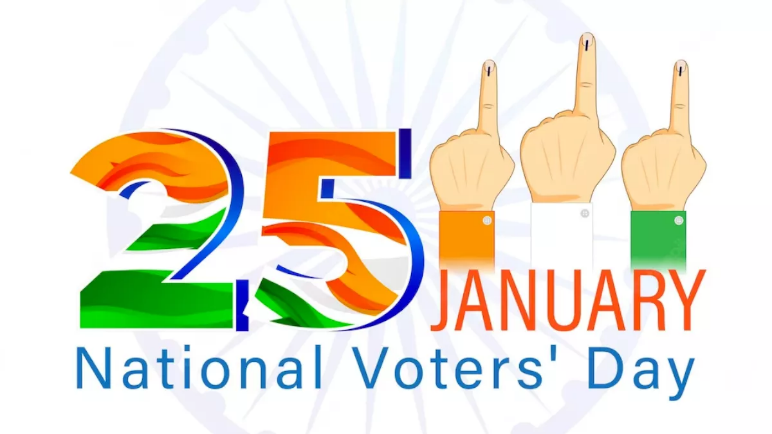
Disclaimer: Copyright infringement not intended.
Context:
- Election Commission of India is celebrating 13th National Voters’ Day on 25th January 2023.
Background:
- In order to encourage more young voters to take part in the political process, Government of India decided to celebrate January 25 every year as "National Voters' Day".
- It has been started from 25 January 2011 to mark the foundation day of Election Commission of India.
2023 National Voter’s Day:
- The theme for this year’s NVD, ‘Nothing Like Voting, I Vote for Sure’.
- It is dedicated to voters which conveys individual’s feeling and aspiration towards participation in the electoral process through power of their vote.
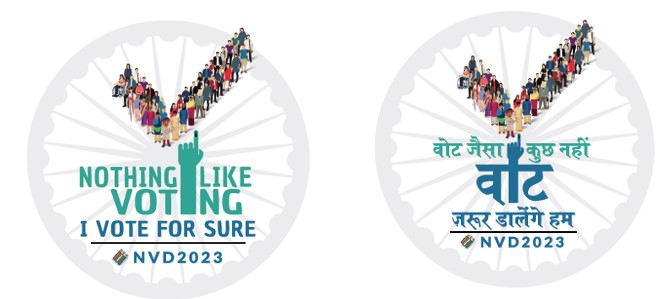
- The logo is designed to showcase festivity and inclusivity of the electoral process.
- Ashoka Chakra in the background represents the largest democracy of the world, whereas the inked finger represents participation of each and every voter of the country. The tick mark in the logo stands for informed decision making by the voter.
Evolution of Electoral System of India:
- After India attained Independence in August 1947, there was a need to hold General Elections to elect a truly representative Government on the basis of universal adult suffrage.
- Article 324, which provides for the setting up of Election Commission as an independent constitutional authority, was therefore brought into force from November 26th, 1949, whereas, most of the other provisions were made effective from January 26th, 1950 (when the Constitution of India became effective).
- Election Commission was formally constituted on January 25th, 1950, a day before India became as Sovereign Democratic Republic. The First Chief Election Commissioner, Shri Sukumar Sen, was appointed on March 21st, 1950.
- The Commission functioned as a single member body from 1950 to October 16th, 1989 but was converted into a three member body on October 16th, 1989 to January 1st, 1990.
- In the year 1990, January 1st, it was reverted to the system of single-member body. However, since October 1st, 1993, the Commission is regularly functioning as a three-member body.
- The Chief Election Commissioner and two Election Commissioners are given the same salary and allowances as of a Judge of the Supreme Court.
- All the three Commissioners have equal powers in decision making and in case of any difference of opinion on any issue, the decision is taken by the majority.
- The term of the office of CEC and ECs is six years or till the age of 65, whichever is earlier.
- For the purpose of first General Elections to the Lok Sabha and Vidhan Sabhas, the first delimitation order was issued by President, in consultation with Election Commission and with the approval of Parliament on August 13th, 1951.
- To provide a legal framework for the conduct of elections, Parliament passed the first Act on May 12th, 1950 (Representation of the People Act, 1950) providing mainly for the preparation of electoral rolls.
- It passed the second Act on July 17th, 1951 (Representation of the People Act, 1951) laying down the procedure for the conduct of elections to both Houses of Parliament and Vidhan Sabhas for each State.
- Electoral Rolls for constituencies were published in all States by November 15th, 1951. The total number of voters (excluding J&K) was 17,32,13,635 as against the total population of India (excluding J&K), 35,66,91,760 according to 1951 census.
- The first General Elections to the Lok Sabha and Vidhan Sabhas were held between October, 1951 and March, 1952.
- The first Lok Sabha consisting of 497 members was constituted on April 2nd, 1952.
- The first Rajya Sabha consisting of 216 members was constituted on April 3rd, 1952.
- After the constitution of the two Houses of Parliament and the State Legislative Assemblies, the first Presidential election was held in May, 1952 and the first duly elected President assumed the charge of office on May 13th, 1952. At the time of the first General Election in 1951-52, the Commission had recognized 14 political parties as multi-state parties and 39 parties as the state parties. Presently, there are seven recognized National Party and 40 State Party.
- For the first and second General Elections in 1951-52, and 1957, the Election Commission adopted the ‘Balloting System’ of voting. Under this system, every candidate was allotted a separate ballot box at each polling station in a screened compartment and the voter was required only to drop his ballot paper, the centrally pre-printed ballot papers into the ballot box of the candidate of his choice. From the 3rd General Elections in 1962 onwards, the Commission switched over to ‘marking system’ of voting. Under this system, a common ballot paper containing the names and election symbols of all contesting candidates is printed on which the voter has to put a mark with an arrow cross mark rubber stamp on or near the symbol of the candidate of his choice. All the marked ballot papers are put into a common ballot box.
- The Electronic Voting Machines (EVMs) were used for the first time in part of Parur Assembly Constituency in Kerala in 1982, on experimental basis. Later, the extensive use of EVMs started in 1998.
- The EVMs were used at all polling stations in the country in the 14th General Elections to the Lok Sabha in 2004 for the first time. Since then, all elections to Lok Sabha and Legislative Assemblies have been held using EVMs.
|
EVM
An Electronic Voting Machine (EVM) is an electronic device used for recording votes.
An EVM comprises of a control unit which is placed with the polling officer and a balloting unit which is placed inside the voting compartment.
The role of the polling officer is to release a ballot by pressing the ballot button on the control unit. This will allow the voter to cast his vote by pressing the blue button on the balloting unit against the candidate and symbol of the voter's choice.
EVM's run on normal battery and they do not require electricity. An EVM can be used to record a maximum of 2,000 votes. If an EVM stops working it is replaced with a new one and votes recorded until that time are safe in the memory of the control unit. The control unit can store the result in its memory until the data is deleted or cleared. Changing of the paper roll is strictly prohibited at polling stations.
The arrangement of names of candidates in the ballot paper is in alphabetical order, first candidates from national political parties figure and then from other state registered parties. EVM's are given to the polling station in two stages of randomization by the EVM tracking software produced by the commission.
|
- Since 2001, the issue of unreliability of EVM's has been raised many times but the election commission has ruled out any scope for manipulation of votes through EVM's.
- Voter-verifiable paper audit trail was first used in an election in India in September 2013 in Noksen (Assembly Constituency) in Nagaland. VVPAT along with EVMs was used on a large-scale for the first time in India, in 10 assembly seats out of 40 in 2013 Mizoram Legislative Assembly election.
|
VVPAT
Voter verifiable paper audit trail (VVPAT) or verified paper record (VPR) is a method of providing feedback to voters using a ballotless voting system. A VVPAT is intended as an independent verification system for voting machines designed to allow voters to verify that their vote was cast correctly, to detect possible election fraud or malfunction, and to provide a means to audit the stored electronic results. It contains the name of the candidate (for whom vote has been cast) and symbol of the party/individual candidate.
The VVPAT machine gives instant feedback to the voter, through a printed slip. Essentially, after a voter presses the button confirming their vote for their chosen candidate or NOTA, the VVPAT machine prints a slip containing the name of the candidate and the corresponding election symbol and automatically drops it in a sealed box.
The VVPAT is placed in a transparent glass case, allowing the voter to see the vote. The voter slip is then displayed to the voter for about seven seconds. Then it is dropped in the storage box and a beep confirms this action. The VVPAT can be accessed by the polling officials, but not by the voters.
|
- The NOTA option was first used in the 2013 assembly elections held in four states (Chhattisgarh, Mizoram, Rajasthan and Madhya Pradesh), and the Union Territory of Delhi.
Major Committees of Electoral Reforms:
- India being a democracy, voting and elections play a very vital role. But these two very important processes have been facing a lot of issues in a big democracy like India.
- Some of these issues may include- Communalism and politics, Money Power, Booth Capturing, Violence, and Criminalization of Politics. Therefore, the need for electoral reforms has been ever increasing. This was the view of many committees formed for this matter, some of which are-
- Tarkunde Committee (1974)
- Jaya Prakash Narayan Committee (1974)
- Goswami Committee on Electoral Reforms (1990)
- Vohra Committee Report (1993)
- Indrajit Gupta Committee on State Funding of Elections (1998)
- Law Commission Report on Reform of the Electoral Laws (1999)
- National Commission to Review the Working of the Constitution (2001)
- Election Commission of India - Proposed Electoral Reforms(2004)
- Jeevan Reddy Committee (2004)
- The Second Administrative Reforms Commission (2008)
- With a view to restoring the faith of the public in the democracy of India and its processes, many electoral reforms have been made from time to time.
TARKUNDE COMMITTEE (J.P. COMMITTEE) REPORT ON ELECTION EXPENSES (1974)
In 1974, Jayaprakash Narayan, on behalf of Citizen for Democracy constituted a Committee under the Chairmanship of Justice V.M. Tarkunde, to review the present electoral system and to suggest suitable electoral reforms.
The Committee made the following recommendations:
- The Election Commission should be appointed by the President on the advice of a Committee consisting of the PM, the leader of the opposition in the Lok Sabha and the Chief Justice of India.
- The Committee recommended the formation of Voter's Council in as many constituencies as possible, which can help in free and fair election.
- The Election Commission should be a three-member body.
- The minimum age for voting should be 18 years.
JAYA PRAKASH NARAYAN COMMITTEE:
In 1974, Jaya Prakash Narayan headed a committee consisting of EPW. Decosta, A.G. Noorani, R. D. Desai, PH. Mavlankar, M. R. Masani and V. M. Tarkunde to make recommendations on electoral process or electoral reforms.
The committee suggested to change some criteria in the electoral processes. They are as follows:
- To change in the procedure of appointment of the Chief-Election Commissioner;
- To elect three-member Election Commission;
To reduce the voting age from 21 to 18 years; and
- The television and radio should be placed under an independent corporation.
DINESH GOSWAMI COMMITTEE'S RECOMMENDATIONS (1990)
In 1990, a Committee was constituted by Prime Minister Mr. V.P. Singh under the Chairmanship of the Law Minister, Mr. Dinesh Goswami to suggest measures to eradicate the flaws from the electoral system.
The recommendation made by the Committee regarding the Commission are as follows:
- The Chief Election Commissioner should be appointed by the President after consulting with the Chief Justice of India and the Leader of Opposition.
- The other Election Commissioner should be appointed after the consultation with the Chief Election Commissioner.
- When the tenure of the Chief Election Commissioner and other Election Commissioner is over, they should be made ineligible for any further appointment under the Government.
The other Recommendation made by the Committee are:
- Legislative measure to get rid of the problem of booth capturing, rigging, intimidation. Further giving power to Election Commission to appoint investigation agencies.
- Amendment in Anti Defection law to restrict the disqualification of only those members who give up their membership of the political party and further recommend to empower the President to decide the disqualification instead to Speaker and such power should be exercised on the recommendation of the Election Commission.
- Banning the candidate from contesting the election from more than two constituencies.
- Submission of false accounts by the candidate should also be made an offence.
- There should be a complete ban on mechanically propelled vehicles on polling day and on the sale and distribution of liquor on the polling day and also on caring arm on the poling day.
The recommendation made by the Dinesh Committee led to the enactment of the Chief Election Commissioner and other Election Commissioner (conditions of services) Act, 1961 and the Representation of the People (Amendment) Act, 1996 and the Representation of the People Act, 1998.
The amendment enables the Election Commission to deploy the employees of the autonomous bodies whether fully or partially funded by the Government.15 There are numerous other proposals that remained unimplemented. The united Front Government in the years between 1996 and 1997 considered to implement these proposals and strengthen the Representation of People Act, 1951. But after so many meetings, these proposals remain unimplemented.
VOHRA COMMITTEE REPORT (1993)
- The Vohra Committee which was appointed by Government of India under the chairmanship of Home secretary, N.N. Vohra stated that the entry of criminals in politics has came out clearly in various parts of the country and the nexus between criminals, politicians, police, bureaucracy is of great concern.
- The Report submitted by Central Bureau of investigation to the Vohra Committee clearly states that the crime syndicates have became a part of the politics. Hiring assassins by the politicians from the smaller urbans and rural areas is prevailing.
- The Reports further states that the hiring of local gangs by the politicians of the states like Bihar, Haryana and Uttar Pradesh had enabled these gangs to enjoy the patronage from these politicians.
- Some of these gangs have become the hands of these politicians to gain power in election and to get elected in state assemblies and parliament. In order to curb these types of practices, the Committee recommend to protect politics form merely being a place of protection to criminals.
INDRAJIT GUPTA COMMITTEE REPORT ON STATE FUNDING OF ELECTION (1998)
The National agenda of the then elected Union Government was to make the necessary electoral reforms which were proposed by the Dinesh Goswami Committee. Accordingly, the Union Government which was led by BJP took the initiative to discuss the implementation of those proposal that remains unimplemented.
In order to adhere on its national agenda, a Parliamentary Committee was constituted by then Home Minister L.K. Advani under the Chairmanship of Indrajit Gupta to suggest measures on State funding of election.
The Recommendation made by the Committee are as follows:
- The State funding of election should only be given in kind in the form of certain facilities i.e. there should not be any financial support. The Committee Further suggest to limit the funding to political parties which are recognized at the National level or state level having a symbol allotted by the Election Commission and not to the independent candidates.
- The Committee also proposes that the political parties should maintain their accounts and their audits and should be regularly submitted to Income-Tax authorities. The Committee further recommended that if the party fails to submit their annual report of the
- The Committee further proposed to ban the donations from the Companies. There should be a prohibition on the inclusion of expenses of political parties in the election expenses of the candidates
- The Committee also recommends to empower the Election Commission of India with the Power of fixing the ceiling limits on the election expenses.
JEEVAN REDDY COMMITTEE
The Justice Jeevan Reddy has proposed far Reaching Electoral Reforms.
- The Commission advocated a total ban on splits and mergers of political parties during the term of the Lok Sabha or Legislative Assembly.
- Once a member has been elected on a ticket of a particular recognized party, then he should remain in that party till the dissolution of the House or till the end of his membership by resignation or otherwise.
- The Commission has recommended an adequate representation.
- To discourage non-serious persons from contesting elections, the Commission has recommended a steep ten-fold hike in the deposits of independent and non-recognized party candidates.
- To curb criminalisation of politics, the Commission has suggested that a person should be disqualified from contesting elections to the Lok Sabha or an Assembly if a court has ordered framing of charges in respect of offences listed in the Representation of the People Act, 1951.
RECOMMENDATION PROPOSED BY LAW COMMISSION OF INDIA
The Law Commission of India came forward with three reports proposing several changes in the electoral system in the year of 1999, 2014 and 2015. Following are the recommendation made by law commission in their reports:
(A)Reforms of the Electoral law (1999)
The Law Commission in its 170th Report suggest various amendments in the RPA and in the Constitution of India. The Commission was of the view that to ensure the internal democracy in the functioning of the political parties and to make them effective in achieving the constitutional goals, it is necessary to regulate their formation and functioning by law. The Commission suggested for amending the Tenth schedule of the Indian Constitution. It was suggested that if any member of any party decided to switch a party, he should resign from the membership of the House and must seek a fresh election.
The Law Commission further proposed to amend the Representation of People Act, 1951 by suggesting that when a charge is framed by the criminal court for any of the specified offence, the candidate against whom such charge is framed should remain disqualified till S/he is acquitted.
(B) Electoral Disqualification (2014)
The Law Commission in its 244th Report made a proposal to disqualify a candidate at the time of faming of charges by adopting such legal safeguards in order to curb the misuse. The Commission further suggest to include only those offence punishable with an imprisonment of five years and above. Such provision shall operate till the trial court acquit the candidate or for a period of six year whichever is earlier. On a question, if a charge is framed against a sitting MPs/MLAs, the Commission suggest that the trial must be concluded with in a year.6 The Commission also recommended to include conviction under section 125-A of RPA i.e. filling false affidavit as a ground of disqualification and also to enhanced the sentence of filing false affidavit to minimum two years.
(C)Electoral reforms (2015)
The Law Commission, a year later submitted its another report on electoral reforms. The Commission in its 255th Report suggested that the expenses made in the election must be counted from the date of notification of the election and not just from the date of nomination.8 The further suggested some measures to strengthen the Election Commission of India. The Commission reject to invalidate the election on the basis of NOTA. The Commission is also not in favor of introducing right to recall as it can undermines the independence of the elected candidates. The Commission also submitted amendments related to compulsory voting, totalizer for counting votes.
NATIONAL COMMISSION TO REVIEW THE WORKING OF THE CONSTITUTION OF INDIA (2001)
A Commission was set up by then Union Government under the Chairmanship of Justice M.N. Venkatachaliah to review the working of the Constitution and suggesting possible recommendation to amend the Constitution.29 The Committee make a total of 248 recommendation, out of which 58 were related to the amendment in the Constitution, 86 were related to legislative measures and the rest of the amendment require executive action.30 Some of the recommendation proposed by the NCRWC related to electoral reforms are as follows:
- The Commission proposed to disqualify the candidate permanently if s/he is convicted for any heinous crime. The Commission proposed a law named as Political Parties (Registration and Regulation) Act, under which party violating the provision of the Act must be deregistered.
- The Commission also recommends to increase the ceiling limits on election expenses and the expense should include both the expense of the candidate, his friend, the wellwisher and the political party. As under the present law, there can not be any violation of the expense limit because the expenses made by person other than the candidate shall not be counted as election expenses.
- The Commission also recommends for the use of common electoral rolls for all election. This recommendation was also accepted by the Election Commission of India.
- The Commission also recommends that under section 58-A, the Election Commission should be vested with the power to order a fresh election, void the election results, or order a re-poll.
- The Commission also suggest the procedure to appoint Chief Election Commissioner and other Election Commissioner. They should be appointed on the recommendation of a body consisting of the Prime Minister, Leader of the Opposition in the Lok Sabha, Leader of the Opposition in the Rajya Sabha, the Speaker of the Lok Sabha and the Deputy Chairman of the Rajya Sabha.
- The Commission has also made proposal related to regulating the political parties, making it compulsory for the parties to maintain the accounts, setting up of Special Election Tribunals, the power of registration and de-registration of the political party should be in hand of the Election Commission.
The recommendation made by the NCRWC were remain merely as recommendation because these recommendations were not accepted by the consecutive Government.
SECOND ADMINISTRATIVE REFORMS COMMISSION (2008)
Under the Chairmanship of Shri M. Veerappa Moily, Second Administrative Reforms Commission was constituted to suggest measures and remodel the public administrative system which is responsive, accountable and efficient.37 The Commission in its fourth report titled “Ethics in Governance” suggest reforms regarding electoral process. The Commission had made similar recommendation which are also proposed by NCRCW related to appointment of Election Commissioner, their power also to amend section 8 of RPA. The Commission also made similar recommendation related to maintaining and auditing of accounts of political parties which was also proposed by Indrajit Committee.
ELECTION REFORMS PROPOSED BY ELECTION COMMISSION OF INDIA (2016)
In order to clean the politics form criminals and to cleanse the political funding. The Commission have been regularly suggesting reforms on different subjects to the Government. Some of the proposal sent by Election Commission of India have been examined by the Law Commission were sent to parliament for endorsement and some are still the proposed suggestions. Some of the measures which were suggested are as follows:
(A)Criminalization of Politics
Criminalization of politics has always been one of the most debatable issues for parliament to tackle. The Election Commission has always been expressing its concern over the influence of criminals on politics. The Commission both in the year of 1998 and 2004 had proposed to amend section 8 of the RPA. This recommendation was again given in the year 2016. The Commission suggested that the candidates should be obliged to disclose their criminal records on an affidavit so that the voter will be informed and will also be able to exercised their right to vote freely. This similar observation was also made by the Supreme Court in the recent case of Krishnamoorthy v. Sivakumar & Ors.39 The Commission also recommends to de-barred the candidate from contesting the election against whom the charges are framed. The Commission also recommended that the political parties should file a declaration that they would not give tickets to the convicted criminals even those who are convicted for less than 5 years.
(B) Registration and De-registration of Political Parties
The Commission was of the view that, there are numerous political parties which did not contest election but are registered as political parties in order to get relief in income tax. The Commission also recommends that the power to register or de-register a political party should be vested in the Election Commission in order to eliminate these parties and also if any political party violate any provision of the law.
(C)Election Financing
In spite of the recommendation made by different Committees to curb the role of money power in politics, the position remains the same. The Election Commission in its recent report, while referring to Common Cause A Registered Society v. Union of India and others41, recommends that the political party should be mandated to maintain the details of all the donors in order to maintain transparency. The Commission also recommends making amendments in section 77 of the RPA, 1951 in order to ensure the accountability of the political parties and candidates and also to place a check on their election expenditure.42 The Commission had also made such other recommendations which were related to the introduction of common electoral rolls, enhancing the sentence under section 125A RPA, amendment in section 8 of RPA, and use of a Totalizer for counting the votes which are also suggested by the law Commission and also by other Committees.
Conclusion:
Elections are considered as the representation of the sovereign will of the people of a country. So, they need to be free from any interference from any malpractice. Any election which is manipulated or managed by any external force is nothing more than a fraud to people. During the early years of Independence, the free and fair elections used to happen by themselves without any distortion. However, things become more complex with the passage of time, the role of the Election Commission also increased. Although the ECI has been performing its role of activism which was started by T.N. Seshan but various pending cases have clearly suggested that the ECI needs some reforms related to the appointment of election Commissioners and to enhance its power.
This article analyzed the various reforms suggested by different committees to make the political institution more effective and free form any criminal interference. These reforms are pre-requisite over all other reforms. Finally, after analyzing all the proposed reforms by different committees, it can be said that these reforms can only be successful when all the parts of the electoral machinery- the political parties, the candidates, and the voter adhere to them. The role of independent media also cannot be denied.
https://newsonair.gov.in/Spotlight.aspx#
.jpeg)
JERUSALEM
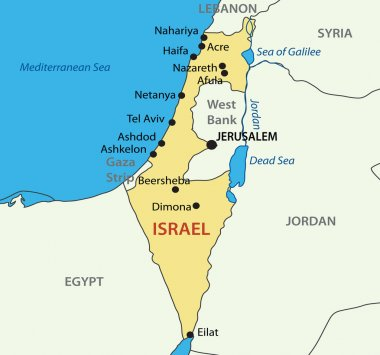
Context:
- India has strongly condemned terror attack in Jerusalem.
Jerusalem:
- Jerusalem is a city in Western Asia.
- Situated on a plateau in the Judaean Mountains between the Mediterranean and the Dead Sea, it is one of the oldest cities in the world.
- Jerusalem is situated on the southern spur of a plateau in the Judaean Mountains, which include the Mount of Olives (East) and Mount Scopus (North East).
- It is considered holy for the three major Abrahamic religions: Judaism, Christianity, and Islam.
- The city straddles the Green Line between Israel and the West Bank.
- Both Israelis and Palestinians claim Jerusalem as their capital.
- Due to this long-running dispute, neither claim is widely recognized internationally.
- The Old City became a World Heritage Site in 1981, and has been on the List of World Heritage in Danger since 1982.
- Mount Herzl, at the western side of the city near the Jerusalem Forest, serves as the national cemetery of Israel.
- The city is characterized by a hot-summer Mediterranean climate (Köppen: Csa), with hot, dry summers, and mild, wet winters.
https://newsonair.gov.in/News?title=India-strongly-condemns-terror-attack-in-Jerusalem&id=454825
SESHACHALAM HILLS
Context:
- A wildlife team recently stumbled upon a ‘Spot Bellied Eagle Owl’ (Bubo Nipalensis) for the first time in the Seshachalam forest, and for the third time in Andhra Pradesh.
Read: https://www.iasgyan.in/daily-current-affairs/spot-bellied-eagle-owl
About Seshachalam Hills:
- Seshachalam Hillsare hilly ranges part of the Eastern Ghats in southern Andhra Pradesh .
- The Seshachalam hill ranges are predominantly present in Tirupati district of the Rayalaseema region in Andhra Pradesh.
- The ranges were formed during the Precambrian supereon (3.8 billion to 539 million years ago).
- Minerals contained in these hills include sandstone and shale interbedded with limestone.
- The ranges are bounded by the Rayalaseema uplands to the west and northwest, and the Nandyal Valley to the north.
- Tirupati, a major Hindu pilgrimage town is located in the hills.
- The hills contain seven peaks namely, Anjanadri, Garudadri, Narayanadri, Neeladri, Seshadri, Venkatadriand Vrishabhadri.
- The Srivenkateshwara National Park is also located in these ranges.
- The famous Natural Arch, Tirumala Hills is also a part of Seshachalam Hills.
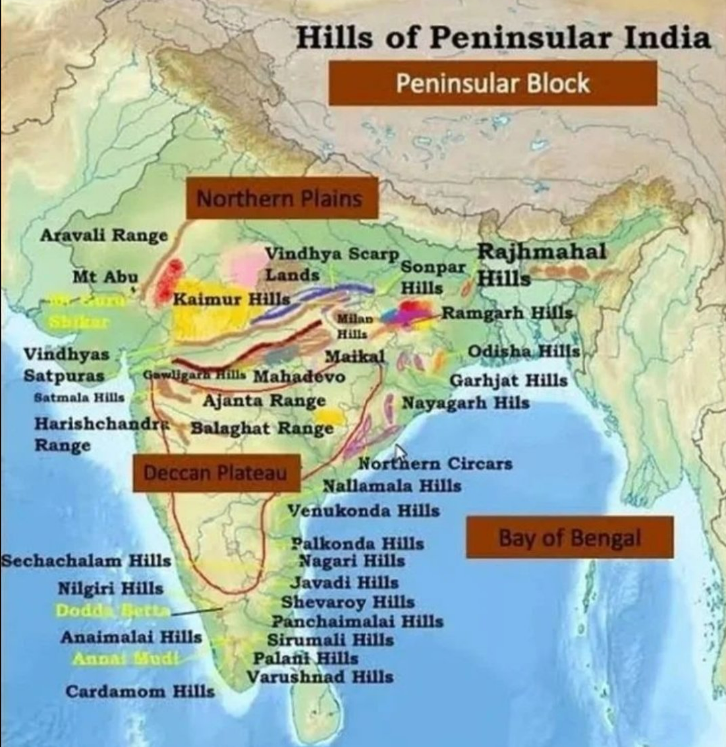
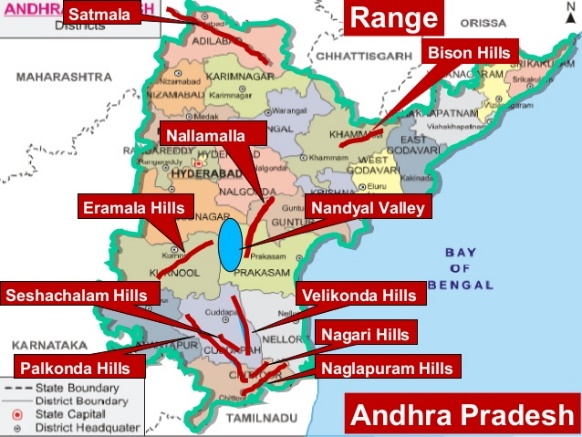
https://newsonair.gov.in/News?title=Ghost-of-the-Forest-or-the-Spot-Bellied-Eagle-Owl&id=454422

SOMALIA
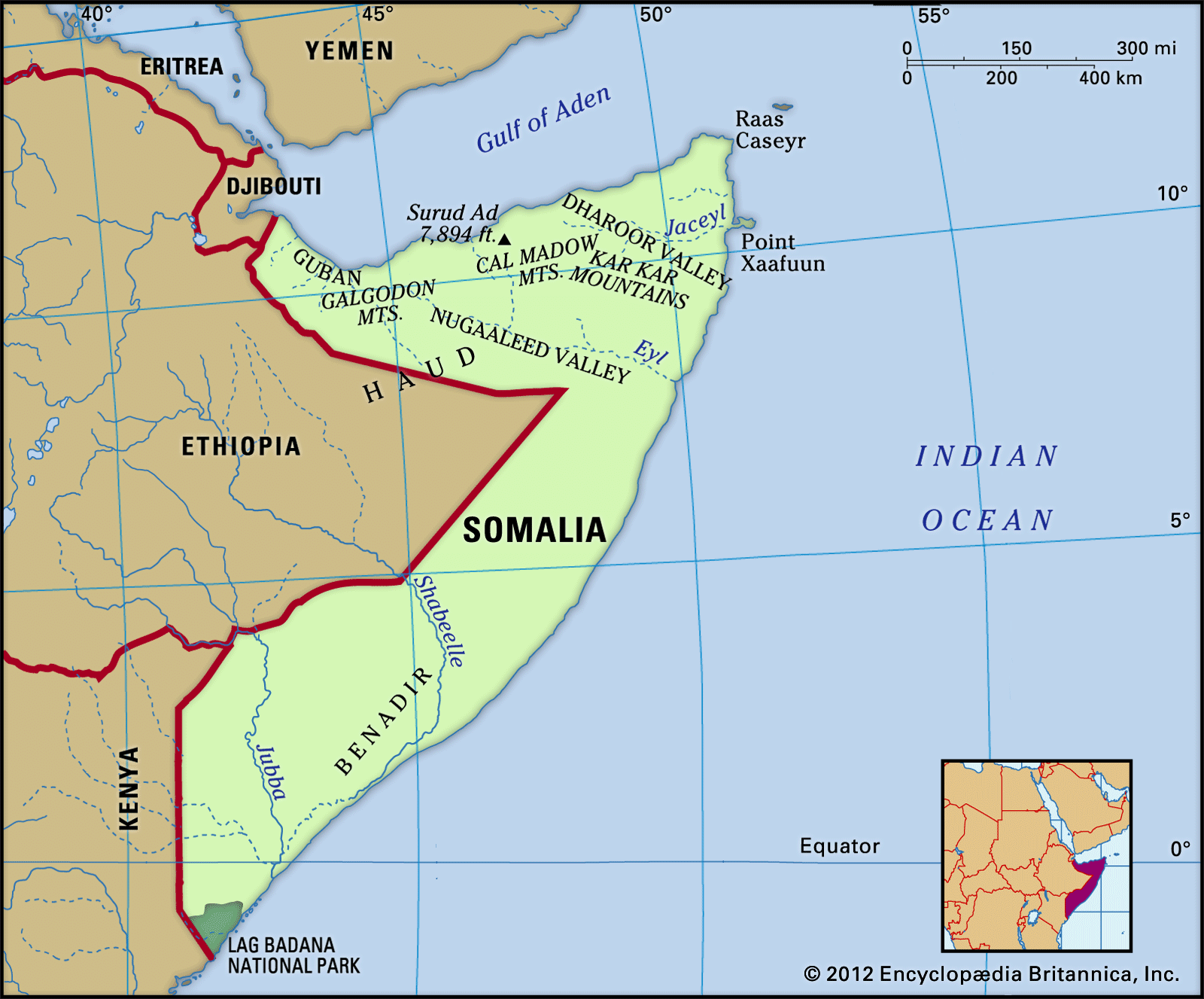
Context:
- A US military operation has killed a senior ISIS leader and 10 members of the terror group in northern Somalia.
About:
- Somalia is a country in the Horn of Africa. Somalia is bordered by Ethiopia to the west, the Gulf of Aden to the north, the Somali Sea and Guardafui Channel to the east, and Kenya to the southwest. Somalia has the longest coastline on Africa's mainland.
- Somalia is separated from Seychelles by the Somali Sea and is separated from Socotra by the Guardafui Channel.
- Its terrain consists mainly of plateaus, plains, and highlands.
- Hot conditions prevail year-round, with periodic monsoon winds and irregular rainfall.
https://newsonair.gov.in/News?title=Senior-ISIS-Leader-Bilal-al-Sudani-killed-by-US-military-forces-in-a-special-operation-in-Somalia&id=454721
KHADI FEST- 23
Context:
- The month-long Khadi Fest- 23 was inaugurated by the Chairman of the Khadi and Village Industries Commission(KVIC) Mr. Manoj Kumar in Mumbai.
Details:
- The Khadi Fest will run until the 24th of February 2023 at the KVIC Headquarters in Vile Parle.
- The fest will showcase apparel made of Khadi, Pashmina, Kalamkari, Phulkari, Tussar silk, etc while Dry-fruits, Tea, Kahwa, Honey, Bamboo Products, Carpets, Aloe Vera Products and others will be up for sale.
Significance:
- Events and exhibitions like Khadi Fest provide a platform to the Khadi Institutions, Prime Minister's Employment Generation Programme - PMEGP and Scheme of Fund for Regeneration of Traditional Industries - SFURTI units to market the products of thousands of artisans directly to customers.
|
SFURTI
Scheme of Fund for Regeneration of Traditional Industries (SFURTI) is an initiative by Ministry of MSME to promote Cluster development. Khadi and Village Industries Commission (KVIC) is the nodal Agency for promotion of Cluster development for Khadi.
It was started in 2005.
Objective of the Scheme
▪ To organize the traditional industries and artisans into clusters to make them competitive and provide support for their long term sustainability.
▪ To provide sustained employment for traditional Industry artisans and rural entrepreneurs.
▪ To enhance marketability of products of clusters by providing support for new products, design intervention and improved packaging, and also the improvement of marketing Infrastructure.
▪ To equip traditional artisans of the associated clusters with improved skills and capabilities through training and exposure visits.
▪ To make provision for common facilities and improved tools and equipment for artisans.
▪ To strengthen the cluster governance systems with the active participation of the stakeholders, so that they are able to gauge the emerging challenges and opportunities and respond to them in a coherent manner.
▪ To build innovative and traditional skills, improved technologies, advanced processes, market intelligence and new models of public-private partnerships, so as to gradually replicate similar models of cluster- based regenerated traditional Industries.
|
About KVIC:
- The Khadii and Village Industries Commission(KVIC) is a statutory body formed in April 1957 by the Government of India, under the Act of Parliament, 'Khadi and Village Industries Commission Act of 1956'.
- It is an apex organisation under the Ministry of Micro, Small and Medium Enterprises, with regard to khadiand village industries within India, which seeks to - "plan, promote, facilitate, organise and assist in the establishment and development of khadi and village industries in the rural areas in coordination with other agencies engaged in rural development wherever necessary.".
- In April 1957, it took over the work of former All India Khadi and Village Industries Board. Its head office is in Mumbai.
Objectives of the Commission
The commission has three main objectives which guide its functioning. These are -
-
- The Social Objective - Providing employment in rural areas
- The Economic Objective - Providing saleable articles
- The Wider Objective - Creating self-reliance amongst people and building up a strong rural community spirit.
The commission seeks to achieve these objectives by implementing and monitoring various schemes and programs.
Khadi:
- Khadi, refers to hand-spun and hand-woven cloth. The raw materials may be cotton, silk, or wool, which are spun into threads on a charkha(a traditional spinning implement).
- Khadi was launched in 1920 as a political weapon in the Swadeshi movement of Mahatma Gandhi.
- Khadi is sourced from different parts of India, depending upon its raw materials - While the silk variety is sourced from West Bengal, Bihar, Odisha and North Eastern states, the cotton variety comes from Andhra Pradesh, Uttar Pradesh, Bihar and West Bengal. Khadi poly is spun in Gujarat and Rajasthan while Haryana, Himachal Pradesh and Jammu and Kashmir Karnataka are known for the woollen variety.

https://newsonair.gov.in/News?title=Khadi-Fest-23-inaugurated-in-Mumbai%3b-Fest-to-run-until-Feb-24-at-KVIC-HQs%2c-Vile-Parle&id=454784









